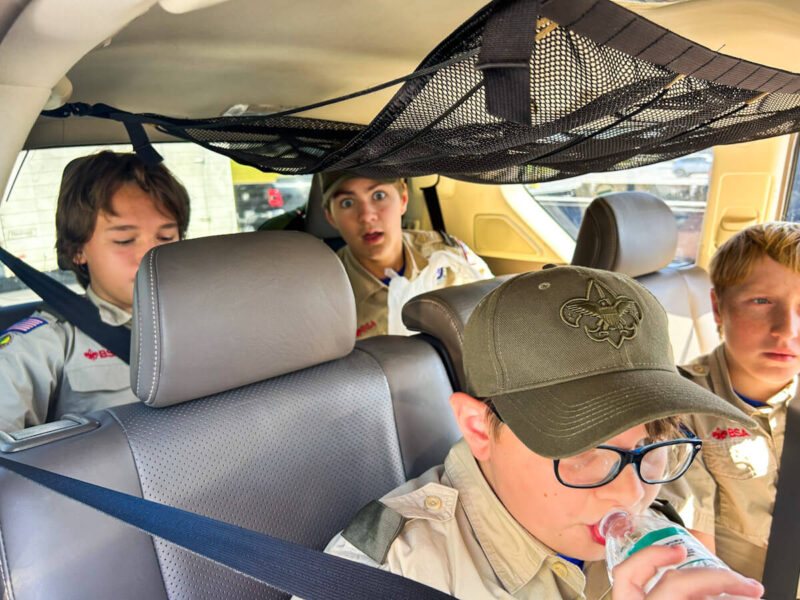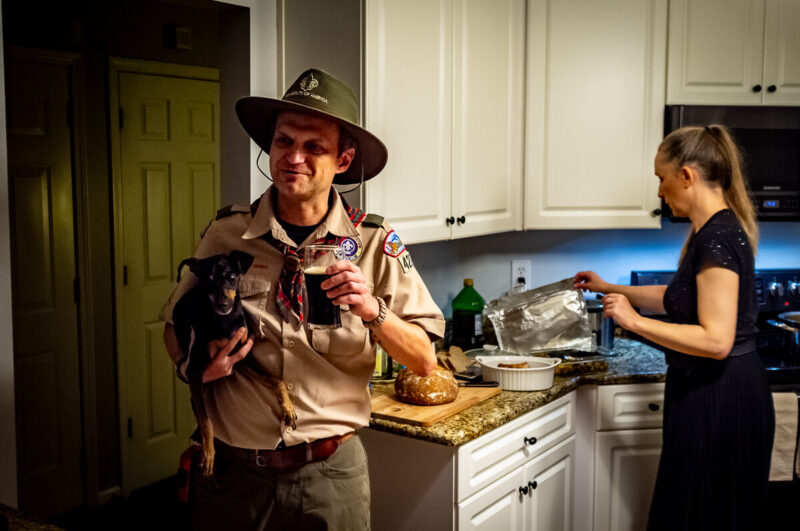
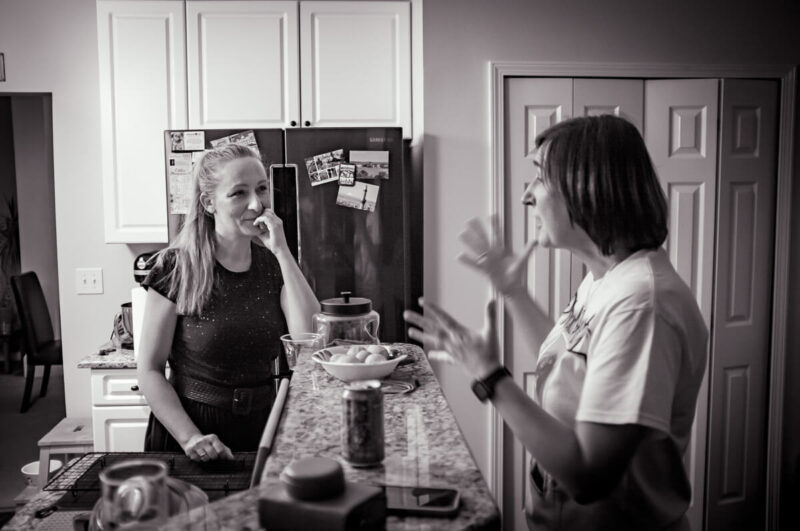
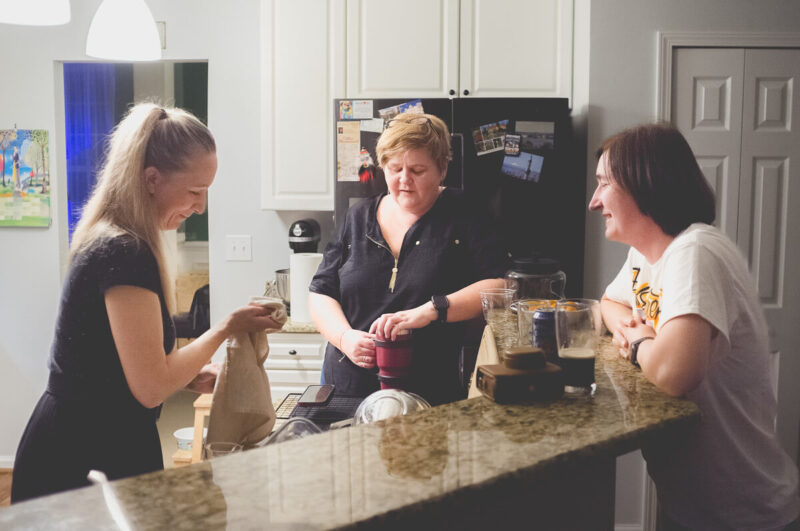

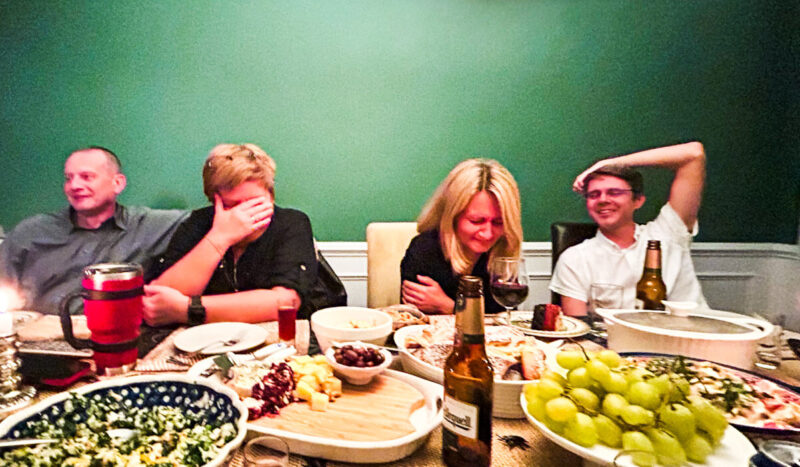
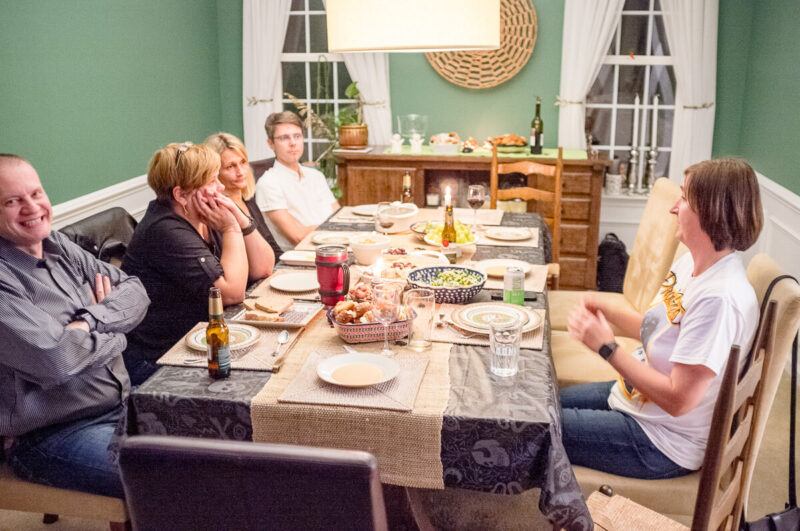






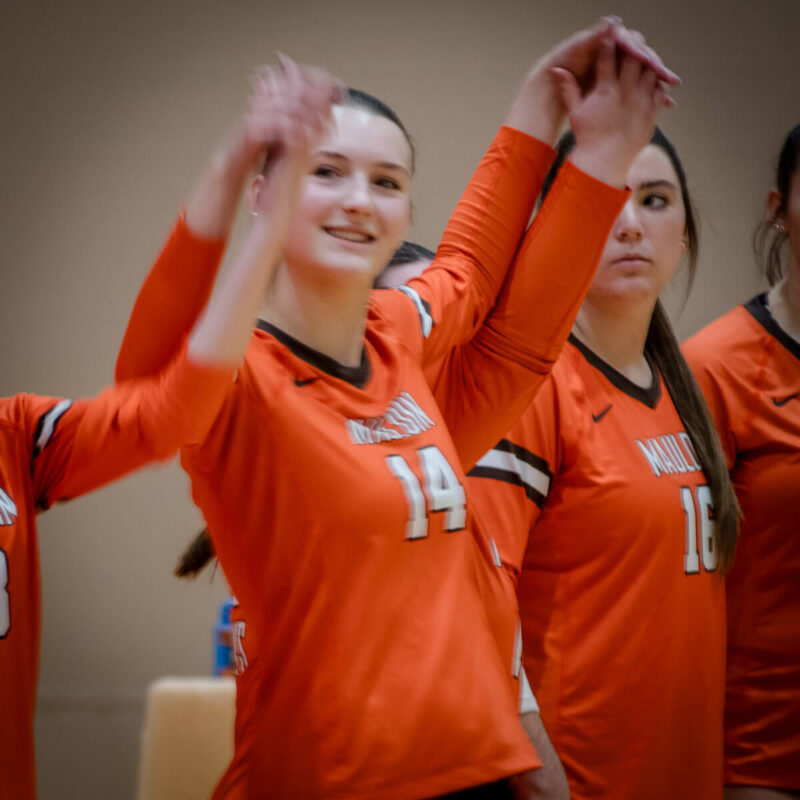
Tonight was the last time the Girl went through the introduction ceremony at Mauldin High. They won their playoff game, but they won’t be playing at home anymore this season. A bittersweet moment to be sure.
I would have just had to see the album cover for Beirut’s 2006 debut album Gulag Orkestar to have known they would be something special.
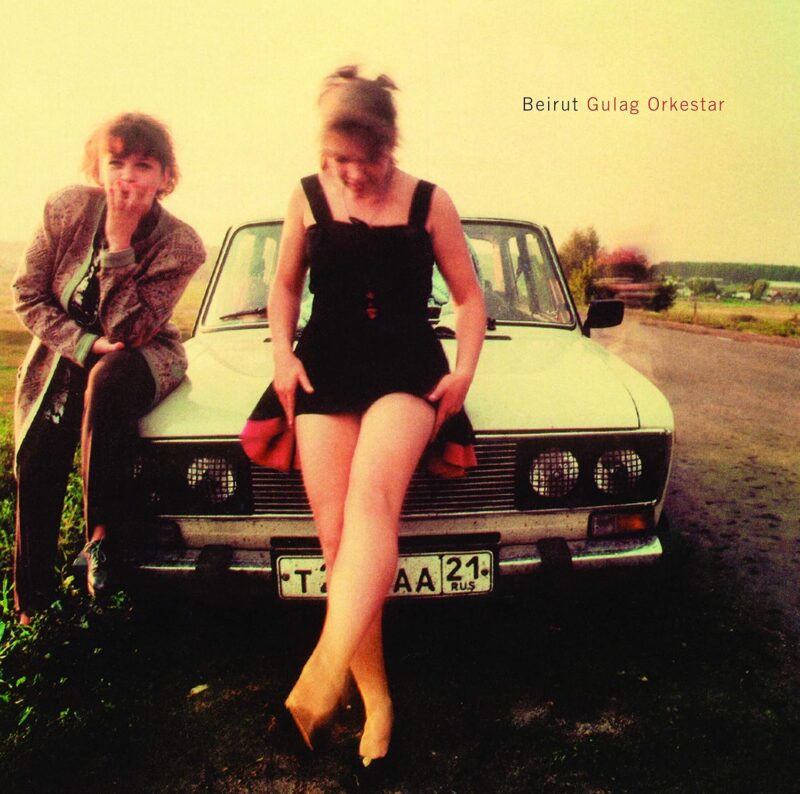
As it was, I discovered the thanks to Spotify’s auto-curated playlist the app plays at the end of an album. Band of Horses’ debut Everything All the Time finished up and Spotify began picking songs based off that last selection. A song by Beirut came on, and it had my attention immediately. Accordion, Balkan-style brass, and a modern rhythmic sensibility. It piqued my interest to say the last. I dove in, choosing their second album based on the cover art itself:
“Cliquot” is a song of longing, a song of nostalgia, a song that is at once timeless and modern. “I didn’t know people made music like this anymore,” I thought when I first heard it, immediately listening to it again.
“Gallipoli” with its electronic opening sounds starkly different, and then the horns enter, and you start to notice a trend in Beirut’s music: brass plays the central. Cue the drums and you have a song that sounds completely different than “Cliquot” and yet strangely similar. The vocals enter, and you wonder if it’s not Morrissey singing.
So we’re on this journey into Beirut’s music together and you look at me and say, “I think we’ve found the common thread.” And I say, “Yes, but we haven’t heard the newest album, Hadsel from 2023.” The organ begins and sudden, it’s as if we’ve never heard Beirut before — totally different.
That angelic voice! Those harmonies! All weaving about the organ (a 19th-century organ in Norway). “This is a new side of Beirut,” you say.
And then the trumpet enters.
Lest one think one has cornered Beirut, there’s songs like “Fyodor Dormant,” which begins with an electronic intro that sounds more like eighties dance music before the horns come in, turning the relatively simple intro into a multi-layered Balkan dance tune.
It even has a drum machine! “A totally different Beirut!” I declare. You smile: you’ve given this a surreptitious listen before. You know — the trumpet is coming.
“East Harlem” is up next, and we’re in familiar territory: a squeeze box introduction. And suddenly there’s piano playing eighth-notes as rhythm. It’s a different side. A lighter side. And then the trumpet enters followed by the other brass instruments, and everything changes. Back to a new same old Beirut.
But where is that pure Balkan-flavored music we got a taste of with “Cliquot”? “Let’s go back to the debut album,” you suggest, and there it is.
“I wonder what Beirut would sound like trying to create a pop so with a catchy music video to go along with it,” you muse. Sounds impossible after “Prenzlauerber,” but if we’ve learned anything about Beirut it’s that nothing is impossible. Cue: “No No No.”
And finally, perhaps their finest moment to date: “Arctic Forest.” That music can be so calming, so beautiful, and yet have a beat that renders some kind of movement irresistible — even if you don’t have a dancing bone in your body — is a miracle itself. Add to that the gorgeous arrangement that seems to build but never overwhelm, and you have one of the most perfect songs ever created.
Beirut has been making music for over fifteen years now, and we’ve only now discovered this treasure. It could be worse: we might never have met with this perfection.
In short, the most original and creative musician currently working.
Tonight was the Girl’s last regular-season volleyball game. Not of the year. Of her high school career. We have at least one more game as playoffs start: we’ll be playing someone somewhere this Thursday, but we won’t know until tomorrow morning who and where.
Six years of volleyball are coming to an end. It’s hard not to get a little emotional about that. Last year, with the conclusion of the season’s final game (the second or so round into the playoffs — perhaps the first? I can’t remember), L was in tears at the end of the game. “It’s just that’s the last time we’ll be playing with our seniors,” she said as she explained that she wasn’t in tears so much because of the loss.
The shoe is on the other foot now, one could argue. It’s the other girls who should be crying because they’re losing L. “It’s just that we’ll never play with L or S again,” they should be saying. Or maybe the tears last year weren’t just about the senoirs leaving.
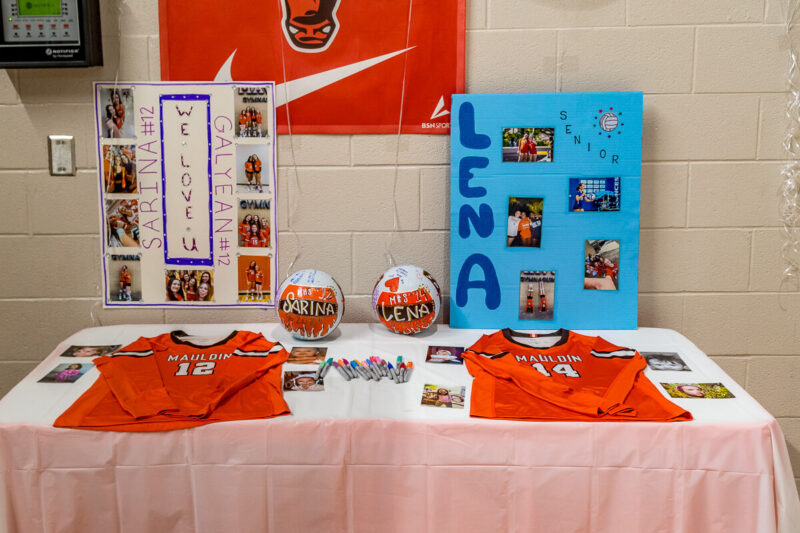
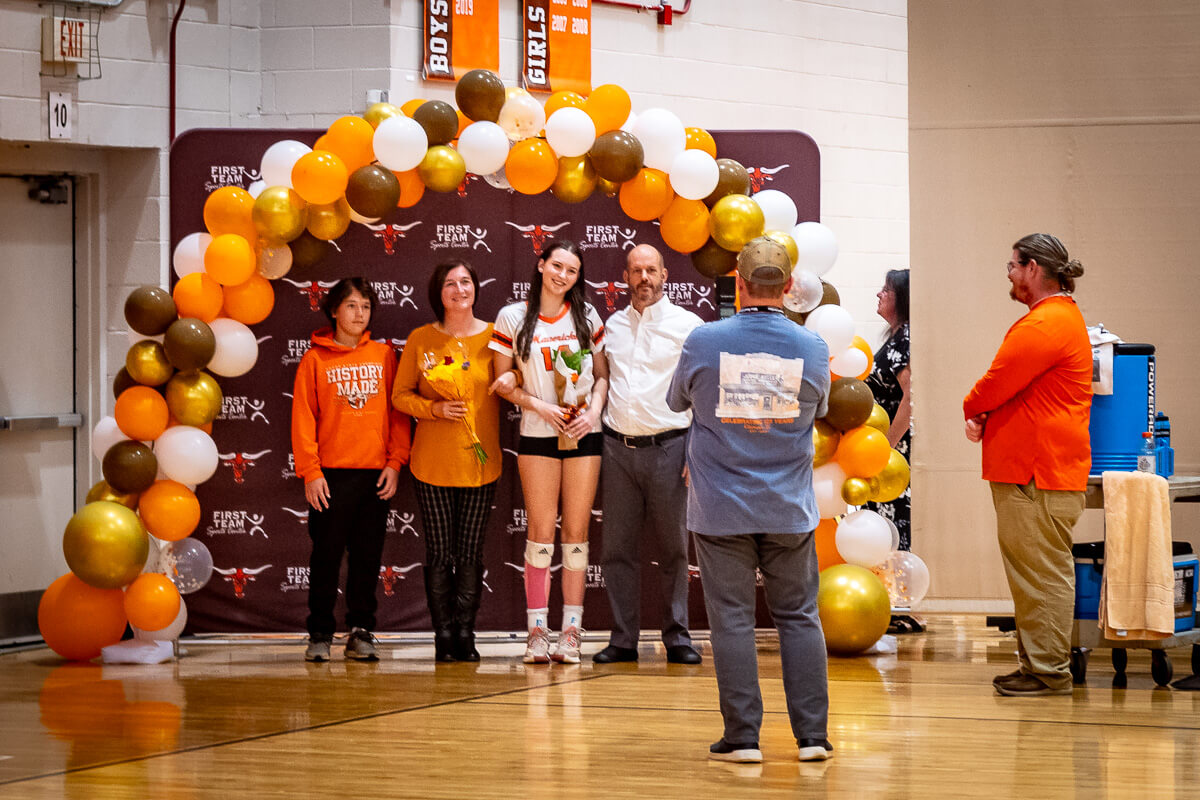
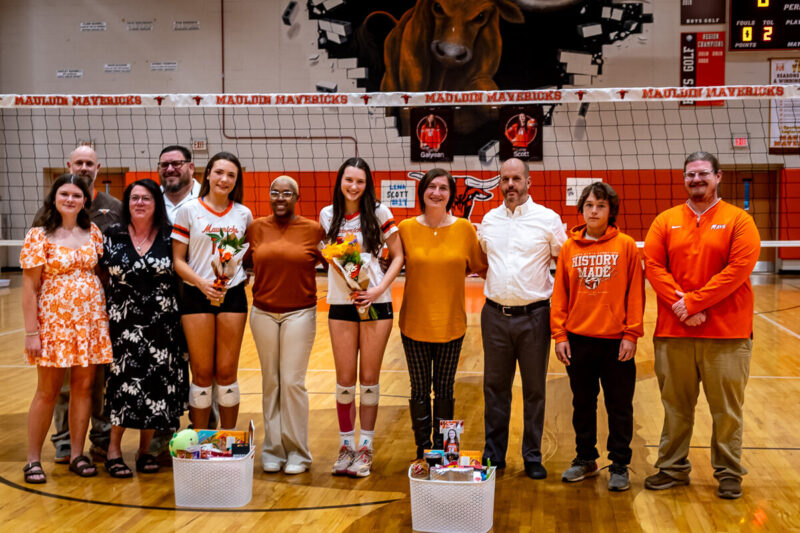
Before the game, we had a ceremony with intros, pictures, and cheers. The girls on the team made gift baskets and posters for the two seniors, and there was a display in the gym entry. The coach had asked parents last week to send some pictures of the girls from various points in their childhood and in their volleyball careers, and she chose a baby picture of each girl and had t-shirts made for the parents. Coincidentally, she chose the same picture Papa’s coworkers chose years ago to make a shirt for him as he retired (for the second time? third?).
After the coin toss and warmups, the girls were introduced — possibly the last time L is introduced on her home court where the cheers are the loudest and most sincere.
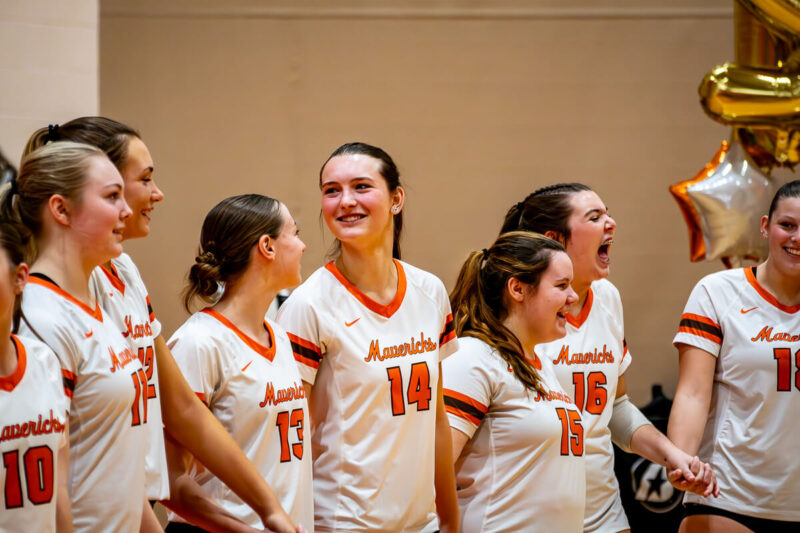
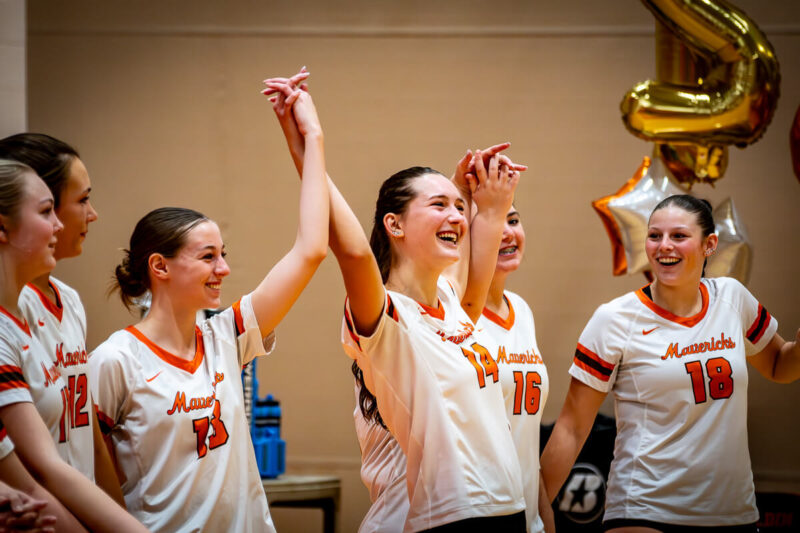
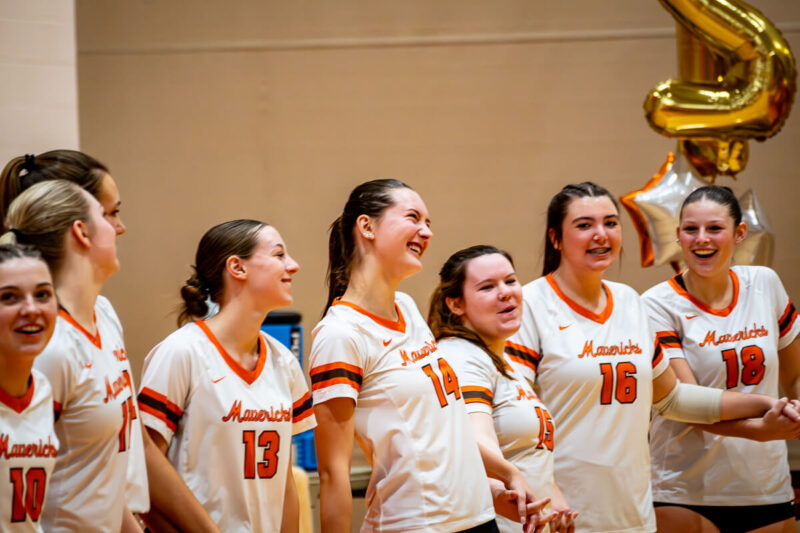
As for the game itself, it was a fairly simple matter: Greenwood’s divisional record before tonight was 1-12. We’d already beaten them once, and we won easily tonight. But I have to hand it to those Greenwood girls: it takes a lot to keep coming out game after game when you’re stacking up loss after loss, almost all of them in straight sets.
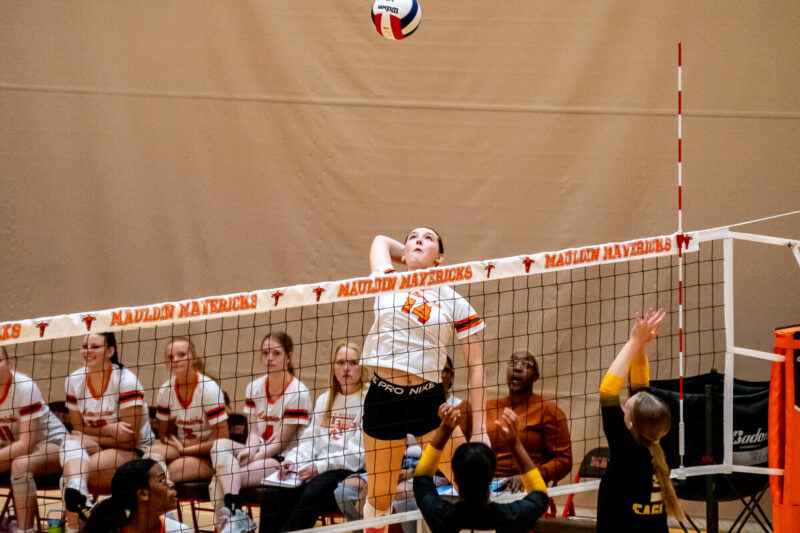
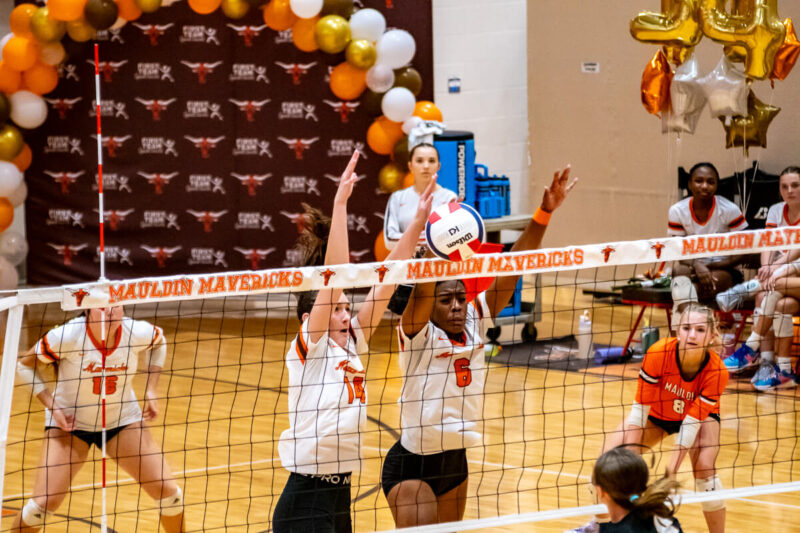
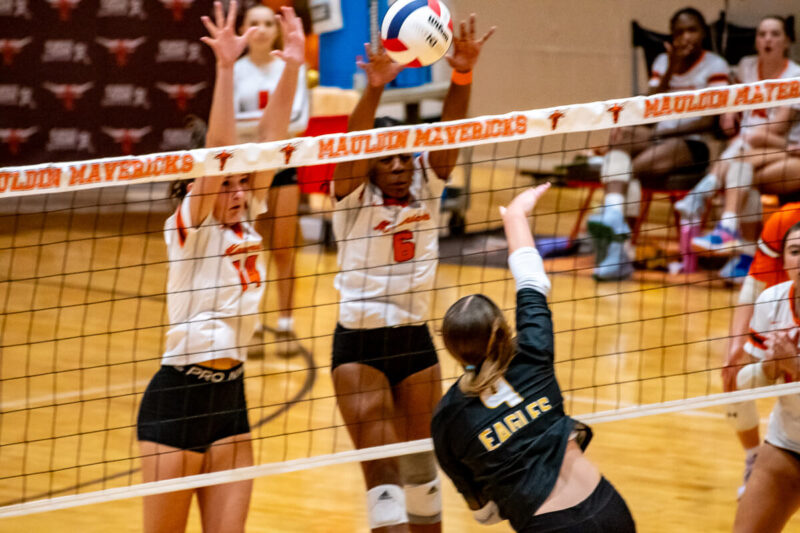
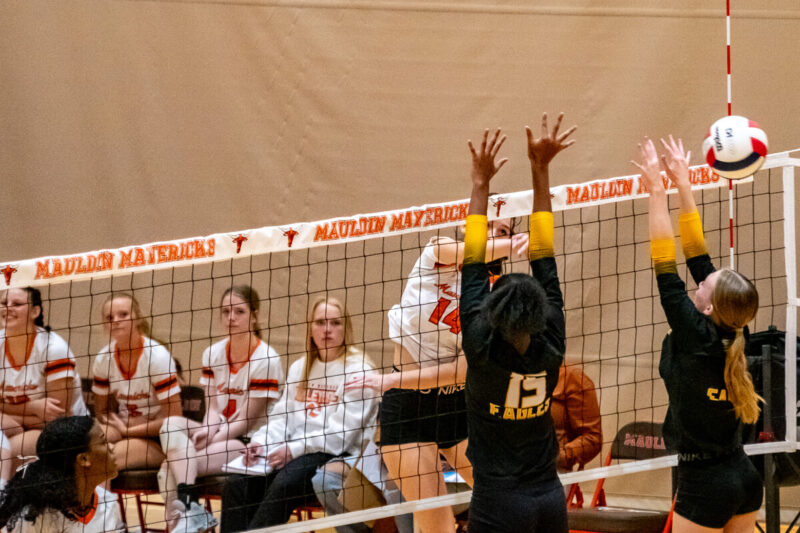
Afterward, there were the usual shots — with the unusual shirts.
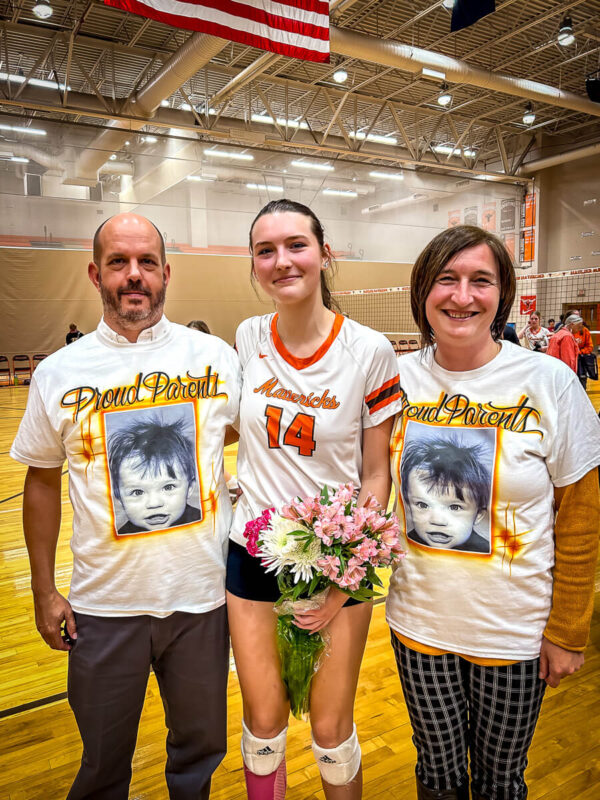
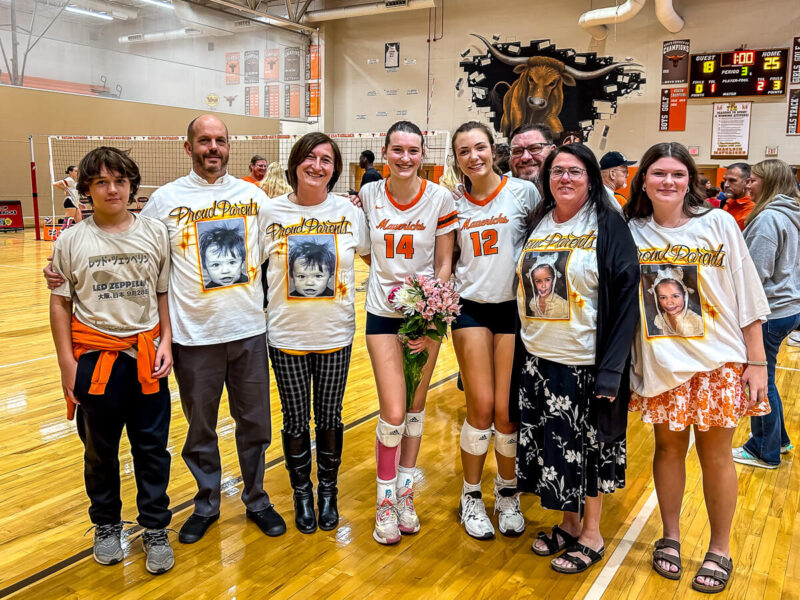
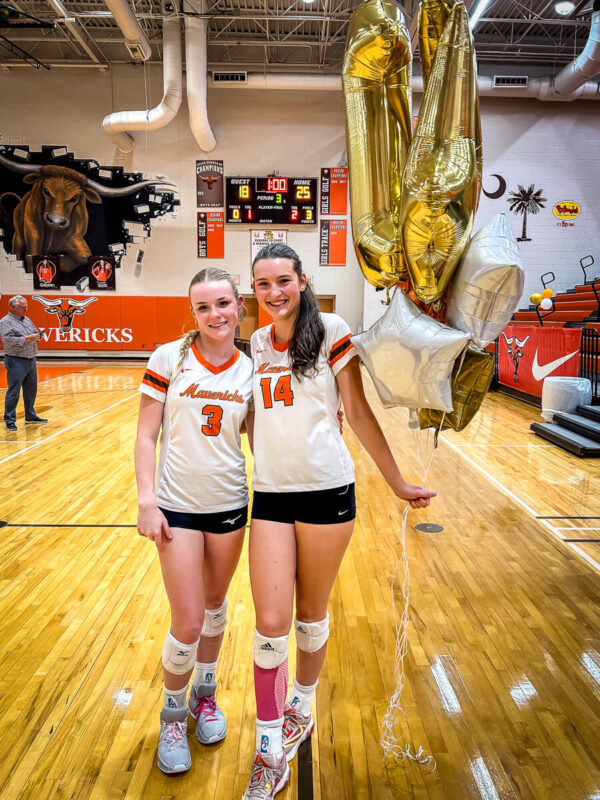
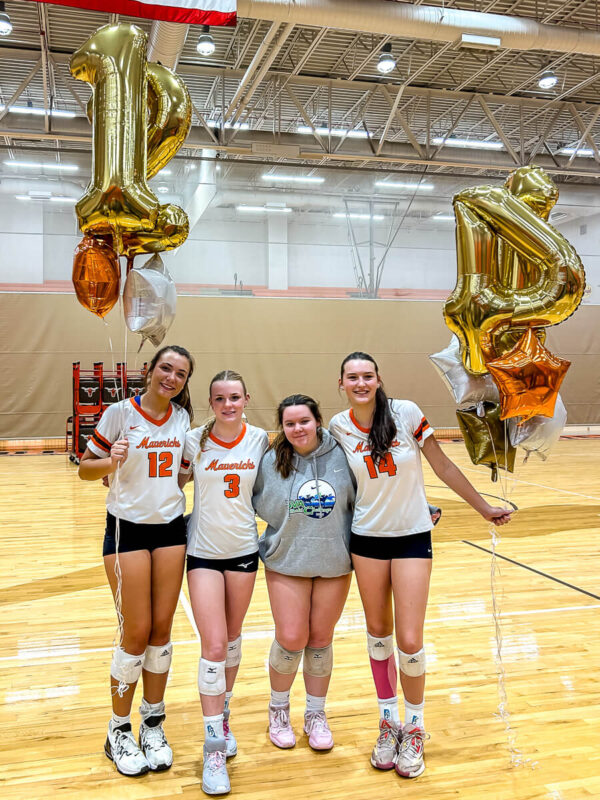
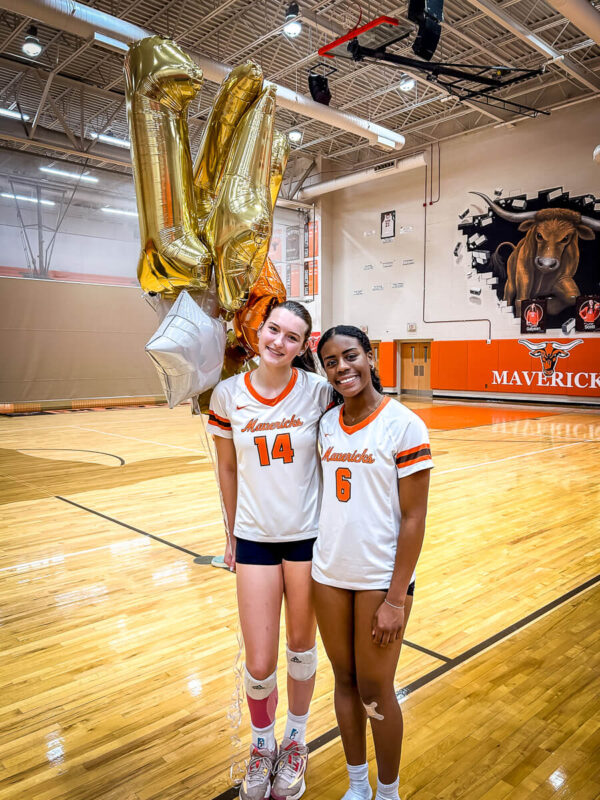


The end of an era is nearing. Tonight was the next-to-last home game in L’s high school volleyball career. It’s likely to be highly emotional on Monday when it’s the last home game, but tonight, there wasn’t time for emotion. It was time for revenge.
Our girls were playing Hillcrest, a team that beat them 1-3 earlier in the year. However, they lost in five sets to Easley, whom our girls beat soundly in straight sets the first time they met this season and won again (though in five sets) the other night at home. It was, in my eyes, a must-win game.
The Girl thought so, too.
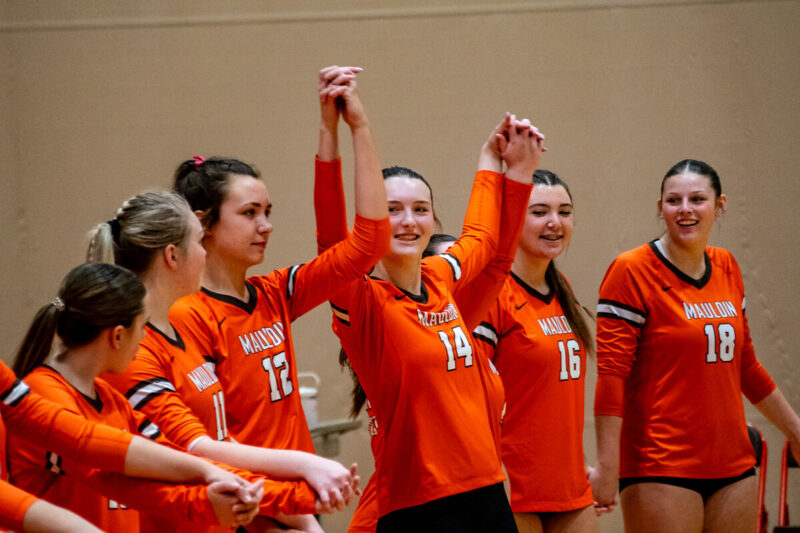
The Mavs started off weakly, though: they trailed most of the first set, and in the end, lost it 19-25. “The Hillcrest girls are so confident,” K observed, “despite the fact that they’ve lost their last five matches.”
Everyone knew the second set was a critical set: lose it, and it would be hard to win the match. Reverse sweeps are not unheard of, but they are rare. We pulled ahead quickly in the second set, and then launched a huge attack that ended the set with a 25-17 win.
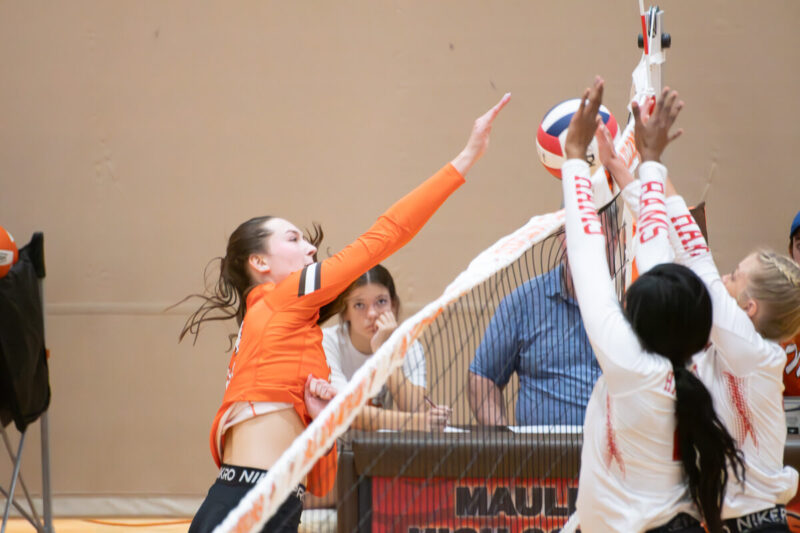
One set each makes the third set the momentum-maker: whoever wins that one needs to win only one more set. At first, I didn’t think our girls wanted it: they trailed by about five at one point. But they pulled back and pulled ahead. Then they let Hillcrest catch up. In the end, though, they held them off and won 25-22.
The momentum was definitely on our girls’ side of the court that fourth set: they pulled ahead after being behind 1-4 and never looked back, winning a deciding third set 25-22. It extended the Hillcrest girls’ losing streak to six, and while I usually don’t like seeing someone lose like that, I didn’t mind too much tonight.
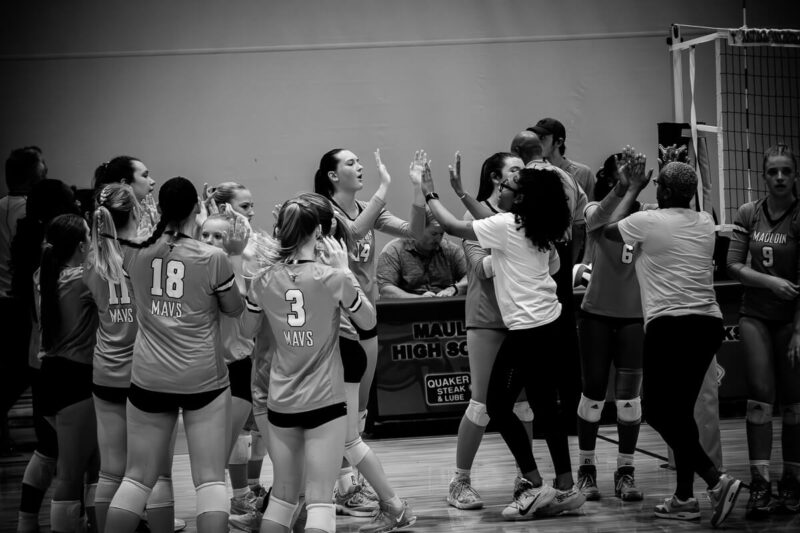
Neither did our girls.
I was discussing with my principal how I’d like to reward the class (fourth period) that had absolutely no NHIs for the whole quarter. That means every student turned in every assignment. Seems basic, mundane even. To put it in context, one class had 57 NHIs for fewer assignments.
“I’d really like to reward them, but it would be great to be able to do something really big for them, like buy everyone lunch. But we’d need a budget like the Department of Defense,” I said.
“We are the DoD,” he laughed. “Those people out their have no idea what we’re saving them from…”
Today we had our first benchmark for this school year. It’s not a benchmark anymore — I can’t remember the new jargonistic name we call it. A something-something predictive assessment. “Predictive” means that it predicts how well students will perform on the SC-Ready test, the end-of-year, state-mandated assessment. Except that it doesn’t. The company that sold the program (Mastery Connect) to the district bragged that it is over 90% accurate in its predictive assessments. Except that it isn’t. We had questions today that weren’t in the pacing guide for first quarter.
“Mr. Scott, what’s a ‘gerund’?” several asked.
“Don’t worry about it. We haven’t covered it. It’s not in the pacing guide until second or third quarter. I can’t remember which. Either way, we will have covered it by the time we get to the SC-Ready test.
The assessment would be a little more useful (i.e., a little more predictive perhaps?) if it weren’t for one small issue, which I elucidated on my daily update for my class website:
All students began the day with the first benchmark of the quarter. We’ll go over the results at some point next week, but since the test is proprietary, we won’t be able to look at or discuss the actual questions because of licensing and copyright. It makes it challenging to use the benchmark as any kind of instructional experience, but we’ll do our best.
That’s right — I don’t get to see the test. At all. I can’t go over the test with students. At all. All in the name of capitalism and profits.
What kind of questions are they? Well, if they’re anything like the questions from our textbook’s unit tests, they’re something like this:
A quick question about a straightforward topic: plot structure:
How does the plot structure and specific events in Passage 1 contribute to the overall meaning of the text?
They create a sense of mystery and suspense, leaving the reader questioning the truth behind Mrs. Sappleton’s husband and brothers’ disappearance.
They highlight the importance of social etiquette and the consequences of misjudging social situations.
They emphasize the theme of deception and the power of storytelling to manipulate perception.
They showcase the protagonist’s journey towards self-discovery and overcoming his anxieties.
But it’s not so straightforward. What exactly does this question mean by (pardon the repetition) “overall meaning”? What is the “overall meaning” of a text? I’m not sure. I know what the overall theme is. I know what the main idea of a text is. I can figure out what a specific, confusing passage means. And I can teach my students to do all these things. But the overall meaning of a text? According to Google’s AI explanation,
The overall meaning of a text is the main idea, or central idea, which is what the text is mostly about. The main idea is the point or message that the author presents and the reader takes from the text.
So it’s just main idea. Or central idea. Still, I hold that, considering how “meaning” is generally used, the question is confusing as hell.
This question has two parts. Students are literally instructed, “First, answer Part A. Then, answer Part B.” But knowing middle schoolers’ reading habits, perhaps it’s best to maintain clarity:
Part A
Which character undergoes significant development in Passage 1?
Framton’s sister
Mrs. Sappleton
Vera
Framton Nuttel
Part B
How does the character development contribute to the overall meaning of Passage 1?
Mrs. Sappleton’s character development enriches the text by revealing her resilient and upbeat demeanor despite the lingering grief over her family’s tragedy, thus underscoring the theme of coping mechanisms in the face of loss.
Framton Nuttel’s character development adds depth to the narrative by showcasing his transformation from skepticism to terror, highlighting the impact of the tragic backstory on his psyche and reinforcing the theme of unexpected shocks in ordinary situations.
Vera’s character development serves to contrast her initial composed facade with her vulnerable moments, emphasizing the theme of appearances versus reality and suggesting the fragility of human emotions.
Framton’s sister’s character development provides context for Framton’s state of mind and his motivations for seeking refuge in the countryside, thereby deepening the reader’s understanding of his character and enhancing the exploration of themes related to mental health and escapism.
Again with the confusing use of “meaning.”
But in the end, it’s not even the confusing use of words. What is the point of these questions? What is the practical application?
I know there’s a practical application; I know there’s a point. I’m not dumb. But I am frustrated. I have some kids who can barely on a third-grade level, and I’m expected to get them to the point that they can not only make sense of such questions but also answer such questions.
It’s overwhelming.

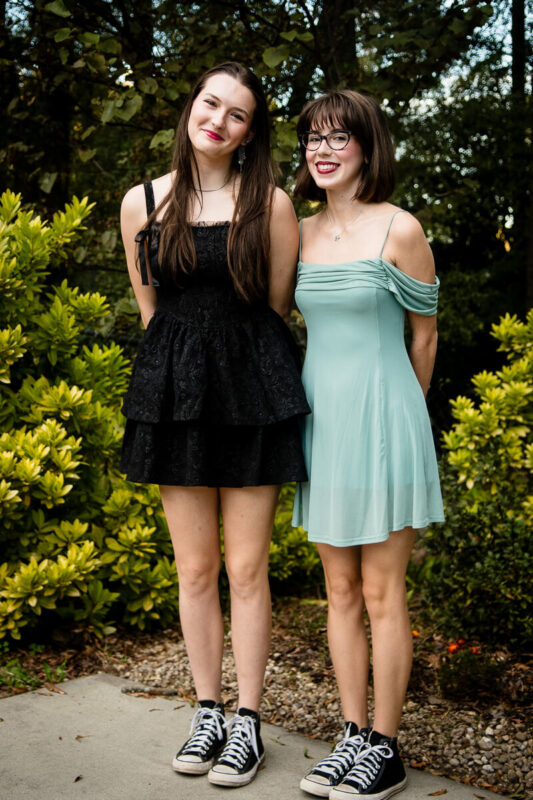


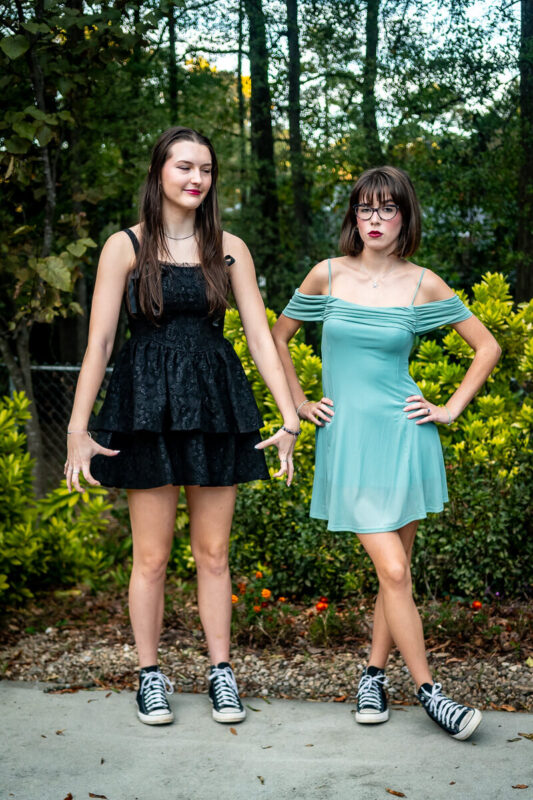

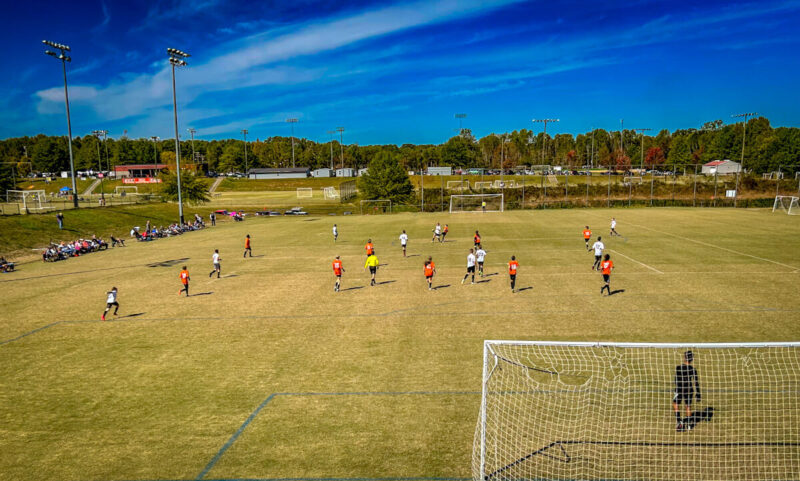
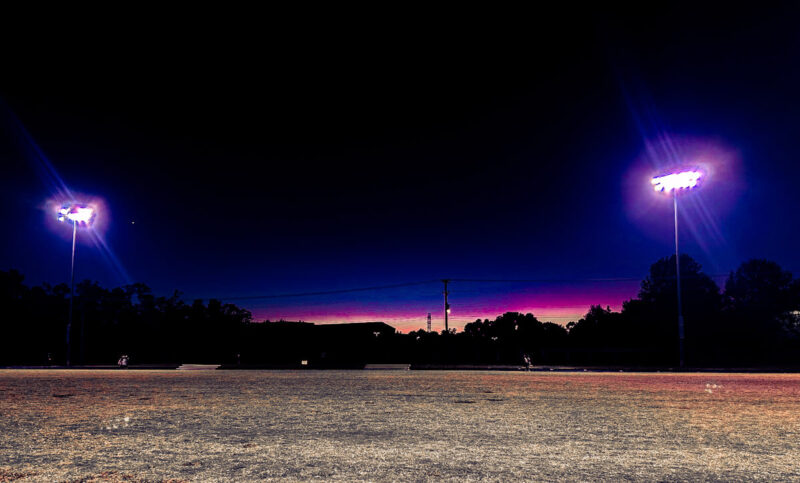
We’re nearing the end. The Girl’s volleyball has been a constant in our lives for years now. The Girl and volleyball — we can’t imagine one without the other. Two years of middle school volleyball followed by four years of high school volleyball with club volleyball each of those years: it’s all coming to an end in just a couple of weeks.
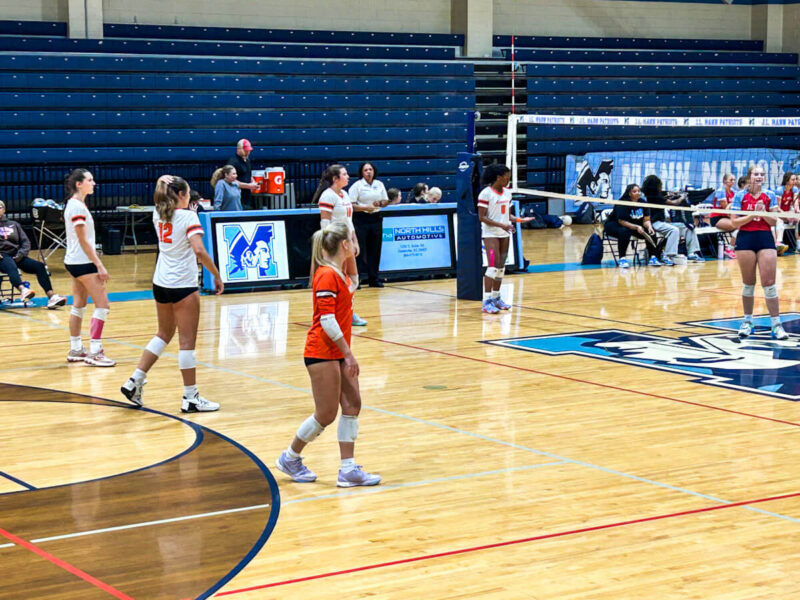
So often, we don’t see the end coming. We don’t know when we’re in the midst of some last or another. The last time we see this person. The last time we visit this place. The last time we watch someone do something they love. This last, though, is approaching with unrelenting certainty.
I revel in nostalgia. I wallow in it at times. These last few days, I’ve been looking for pictures to send to our volleyball coach for the upcoming senior night, and I’ve found pictures throughout L’s volleyball career, one from the very beginning:

She was the Boy’s age in this picture, perhaps a little younger. She was just learning, and an overhand serve was the stuff of dreams. An overhand jump serve (as if you’d do an underhand jump serve) was something she couldn’t even imagine. Now she does the easily (when the coach leaves her in rotate on the back line to serve, which is admittedly rare these days).
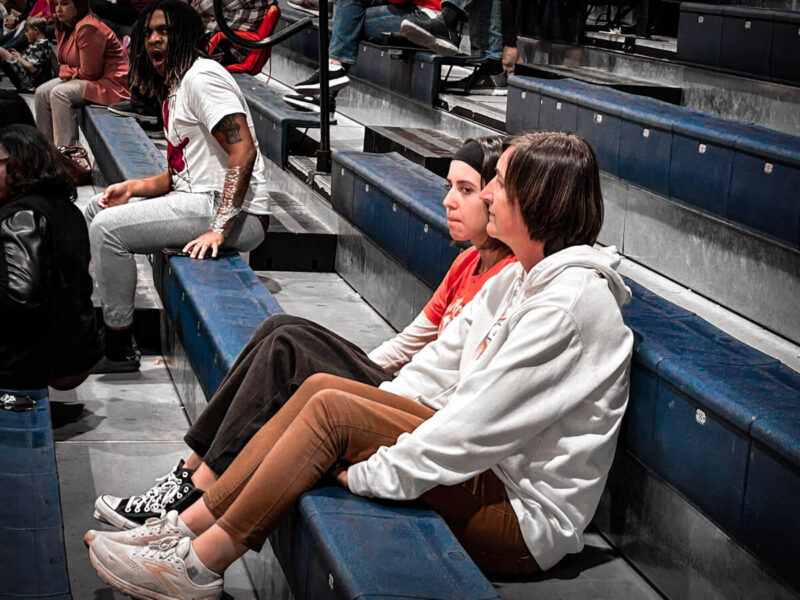
And in a few more games, it will all be over. She’s not going to be playing volleyball college (at last not for the college team — she’ll likely get involved in intermural sports). So we enjoy each game in a way we probably never have.
We’re starting a new unit at with the on-level eighth graders this week, and as I always do, I consulted the district pacing guide to see what the recommended teaching topics were and how much time we should spend on each topic.
It’s a unit on horror fiction (because of Halloween, I suppose), and the first piece in the textbook is a relatively short literary analysis called “What Is the Horror Genre?” — it’s short, but not easy for eighth graders. Nor is it what we could call a high-interest text. The piece in its relatively short entirety:
Many people define horror by its subjects. We all think of creatures like Frankenstein’s monster, Dracula, and the wolfman as monsters in the horror genre. Each one of these creatures has a history and developed over a period of time. But we also know that horror covers more than just these monsters. We could all make long lists of the kind of creatures we identify with horror, especially when we think of films as well as literature. The minute we would start to make such a list we would also realize that not all monsters are alike and that not all horror deals with monsters. The subject approach is not the clearest way to define this genre.
Some students of this genre find that the best way to examine it is to deal with the way horror fiction is organized or structured. Examining the organization of a horror story shows that it shares certain traits with other types of fiction. Horror stories share the use of suspense as a tactic with many other kinds of literature. The tension we feel when a character goes into the attic, down into the basement, or just into the abandoned house is partially a result of suspense. We don’t know what is going to happen. But that suspense is intensified by our knowledge of the genre. We know that characters involved in the world of horror always meet something awful when they go where they shouldn’t. Part of the tension is created because they are doing something we know is going to get them in trouble. Stephen King refers directly to our anticipation of horror. In Salem’s Lot Susan approaches the house which is the source of evil. “She found herself thinking of those drive-in horror movie epics where the heroine goes venturing up the narrow attic stairs . . . or down into some dark, cobwebby cellar . . . and she . . . thinking: . . . I’d never do that!” Of course Susan’s fears are justified. She does end up dead in the basement, a victim of the vampire
If the horror genre uses the character’s search for information to create suspense, it controls when and where we get our knowledge. Because we are outside of the situation we usually know more than the characters. Our advance knowledge creates suspense because we can anticipate what is going to happen. The author can play with those expectations by either confirming them or surprising us with a different outcome. When suspense is an important element in fiction we may often find that the plot is the most critical part of the story. We care more about what happens next than about who the characters are or where the story is set. But setting is often considered a part of the horror genre. If the genre has traditional monsters, it also has traditional settings. Only authors who want to challenge the tradition place events in bright, beautiful parks. We expect a connection between the setting and the events in this genre. We are not surprised to find old houses, abandoned castles, damp cellars, or dark forests as important elements in the horror story. Some people make further distinctions based on how the stories are organized. We can divide stories into different categories based on how we come to believe in the events related and how they are explained to us. Stories that deal with parallel worlds expect us to accept those worlds without question. We just believe Dorothy is in Oz; we accept Oz as a parallel world separate from ours. Other times events seem to be supernatural but turn out to have natural explanations: the ghosts turn out to be squirrels in the attic, or things that move mysteriously are part of a plot to drive someone crazy. Sometimes the supernatural is the result of the way the central character sees the world, as in stories told from the point of view of a crazy person. But at times we are not sure, and hesitate about believing in the possibility of the supernatural. When I first read Dracula I seriously considered hanging garlic on my windows because I believed that vampires could exist. This type of hesitation, when we almost believe, falls into the general category of the “fantastic” (Todorov 25). Often horror has its greatest effect on us because we almost believe, or believe while we are reading the book or watching the film, that the events are possible.
Yet another way of categorizing works of horror is by the source of the horror. Some horror comes from inside the characters. Something goes wrong inside, and a person turns into a monster. Dr. Frankenstein’s need for knowledge turns him into the kind of person who creates a monster. Dr. Jekyll also values his desire for information above all else, and creates Mr. Hyde. In another kind of horror story the threat to the central character or characters comes from outside. An outside force may invade the character and then force the evil out again. The vampire attacks the victim, but then the victim becomes a vampire and attacks others. Stories of ghosts or demonic possession also fall into this category.
We can also look at the kinds of themes common to horror. Many works concentrate on the conflict between good and evil. Works about the fantastic may deal with the search for forbidden knowledge that appears in much horror literature. Such quests are used as a way of examining our attitude toward knowledge. While society may believe that new knowledge is always good, the horror genre may question this assumption, examining how such advances affect the individual and society.
Not exactly a thrilling read for eighth graders. I make an argument before we begin: “Think of this as practice for all the times you’ll have to read a text in the future that really holds no interest for you but is important for this reason or that — job, education, whatever it might be.” But why should be subjecting reluctant readers to something so dry and boring? Why do I do it? The short answer to the second question is simple: the district requires it. Hardly a compelling reason. As for the first question — I don’t have an answer. The situation is simple, though: no one wants to read it because it’s not terribly interesting and it’s at a reading level that’s overly challenging for them. I don’t want to force them to read it because they’re reluctant readers as it is: forcing this shit down their throats only makes them less interested in reading. But the state adopted this textbook which included this piece; the district made the pacing guide; administrators require us to follow the pacing guide; and we teachers are left with the unenviable task of trying to get kids to read this.
As for the pacing guide, we’re to spend four days on this. Day one has four options for the learning target.
(A few words about “learning target.” Education is obsessed with jargon, and the experts at the district and state levels seem to think that changing the name of the jargon and slightly altering how we word the jargon will make qualitative and quantitative differences in the students’ education. Our district used the “Essential Question” as the framing device for each lesson. We were to put them on the board and use it to frame our planning and instructional delivery: the kids at the end of the lesson should be able to answer the question. It might sound like this: “How do I analyze how supporting details contribute to the development of two or more central ideas within an informational text?” Now we’ve got a new silver bullet: the learning target. How would the learning target differ from the essential question above? It’s a radical difference, one that has revolutionized my classroom. “How do I analyze how supporting details contribute to the development of two or more central ideas within an informational text?” becomes “I can analyze how supporting details contribute to the development of two or more central ideas within an informational text.” It’s made a big difference in my classroom. Formerly disengaged learners have come up to me afterward and explained, “Mr. Scott, when we had those essential questions, I felt so lost. I really didn’t know what was going on, and all learning just seemed pointless. With theses new learning targets, though, everything has changed. I’m a new boy! My attention is more focused. My desire to be disruptive has disappeared. And I even do my homework now! Thanks, learning target!”)
The district pacing guide suggests four possible learning targets for the first day:
What are we doing for day two? The district suggests this learning target: “I can edit to use a comma or dash to indicate a pause or break when writing compositions.” So we’re going to make it through this challenging text in one day? Really?
Still, I guess I can see how we could do focus on commas for a while after we finish the text. We might spend some time looking at how the article used commas (Did it really make use of commas? There are a few.) or dashes (Did it really use that many dashes? Not a single one.) and then the next day, we could perhaps do some independent practice with commas. That would be a logical day 3 learning target.
Day 3: “I can identify and revise inappropriate shifts in number when writing compositions.”
What the hell is this? We’re just supposed to suddenly change to another grammar-based idea out of the blue? What happened with comma practice? Are we to get all instruction and all practice done in one day? With squirrely eighth graders? And just what, pray tell, is the connection to our anchor text (another lovely bit of jargon)? Surely day four is going to continue with this subject/verb agreement lesson of day three.
Day 4: “I can use appropriate parallel structure in words, phrases, and clauses when writing compositions.”
Screw it — I give up. I just give up. I understand why this is in there — parallel structure is one of the eighth-grade standards. But it is such a relatively esoteric compositional idea that most adults in the building (other than English teachers) wouldn’t recognize a parallel structure error let alone correct it. I could teach this to my students, but it would take at least a week, and even then, I’m not sure how long they would retain it. And for what? Maybe one question on the beloved end of the year test? (And if it is on the end of the year test, it won’t be worded using “parallel structure.” Instead, it will have a sentence that has a parallel structure problem and the question will be, “What is the best way to revise this sentence?” Getting them to that point? It’s not going to happen.)
I long for a district that says, “We trust your professional judgment. We believe you can quickly assess where your students are, design lessons to improve their reading and writing, and implement those lessons without us telling you all the whats, whens, whys, and hows.” I long for a state department of education that thinks improvement is more important than reaching some arbitrary standard. If I worked in a state and district that required all the people working in administrative positions to spend at least half their day in the classroom themselves so they can see how their policies affect students and teachers, that is exactly the kind of state and district we’d have.
We’re working on poetry in my honors classes, and being halfway through the unit, we’ve turned our attention to one of the most difficult things to do in the class: determine the tone of something. Our something was Billy Collins’s (rightfully) semi-famous “The Lanyard.”
The other day I was ricocheting slowly
off the blue walls of this room,
moving as if underwater from typewriter to piano,
from bookshelf to an envelope lying on the floor,
when I found myself in the L section of the dictionary
where my eyes fell upon the word lanyard.No cookie nibbled by a French novelist
could send one into the past more suddenly—
a past where I sat at a workbench at a camp
by a deep Adirondack lake
learning how to braid long thin plastic strips
into a lanyard, a gift for my mother.I had never seen anyone use a lanyard
or wear one, if that’s what you did with them,
but that did not keep me from crossing
strand over strand again and again
until I had made a boxy
red and white lanyard for my mother.She gave me life and milk from her breasts,
and I gave her a lanyard.
She nursed me in many a sick room,
lifted spoons of medicine to my lips,
laid cold face-cloths on my forehead,
and then led me out into the airy lightand taught me to walk and swim,
and I, in turn, presented her with a lanyard.
Here are thousands of meals, she said,
and here is clothing and a good education.
And here is your lanyard, I replied,
which I made with a little help from a counselor.Here is a breathing body and a beating heart,
strong legs, bones and teeth,
and two clear eyes to read the world, she whispered,
and here, I said, is the lanyard I made at camp.
And here, I wish to say to her now,
is a smaller gift—not the worn truththat you can never repay your mother,
but the rueful admission that when she took
the two-tone lanyard from my hand,
I was as sure as a boy could be
that this useless, worthless thing I wove
out of boredom would be enough to make us even.
Afterward, we listen to Collins doing a reading. The laughter surprises them. Who would think poetry could be funny? Their homework: graph the laugh. Today, we go over it.
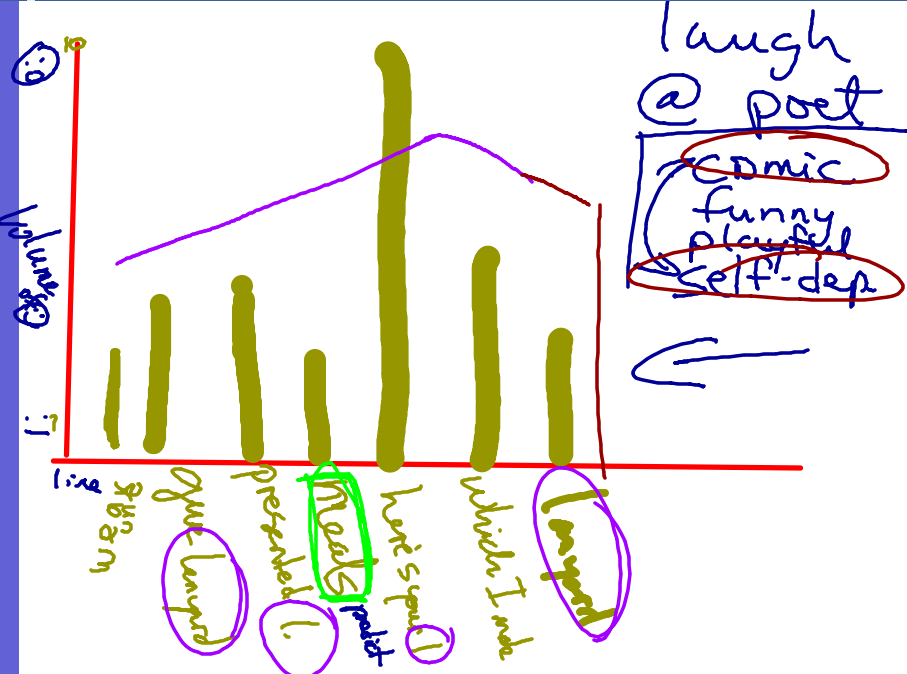
It’s an example of perfect comedic timing. Collins builds the anticipation with the first two lanyard references, which come quickly one after another. Then he goes several lines focusing on the mother before reminding us about the lanyard.
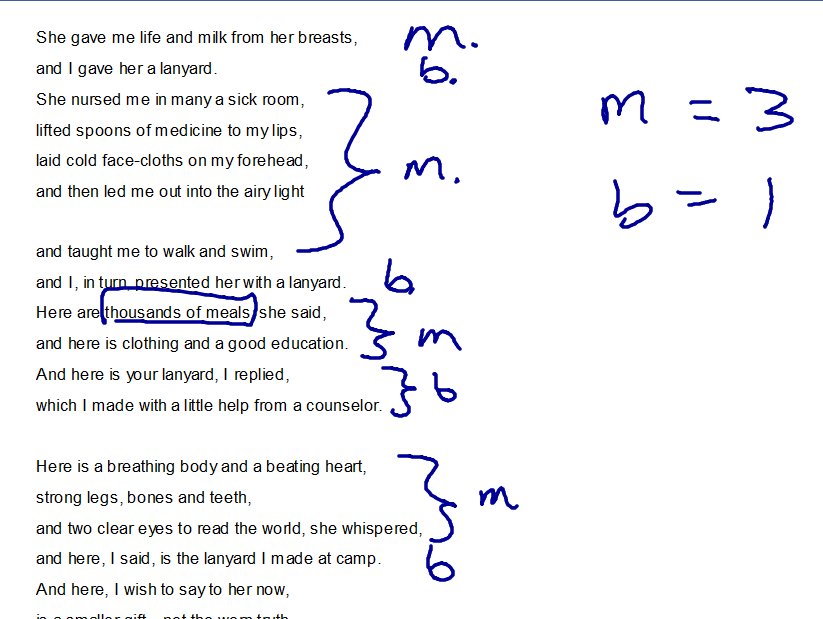
The anticipation is such that the audience even chucks a bit at the line “here are thousands of means” and a little less at “here is clothing and a good education.” The anticipation appropriately high, Collins then hits us with one of the best lines of the poem: “And here is your lanyard, I replied / which I made with a little help from a counselor.”
The kids always find it amusing later, but none of them ever laugh the first times we go through it.
Some day…
Some day…
Few things about religion are as interesting to me as fundamentalist Christians’ ideas about how “the world” (i.e., anyone who is not a fundamentalist Christian, but most specifically anyone they deem “secular”) views them. I recently watched bits of Left Behind: Rise of the Antichrist, the latest in the whole Left Behind movie series. It’s about what will supposedly happen when all the true believers are whisked away to heaven and the heathen are — here comes the title — left behind.
The main protagonist, whose wife and young son were raptured away, decides to visit the church she attended. The voice-over narration explains that as soon as the Christians disappeared, churches were the target of violent protest. This included the graffiti below: “All souls matter!”
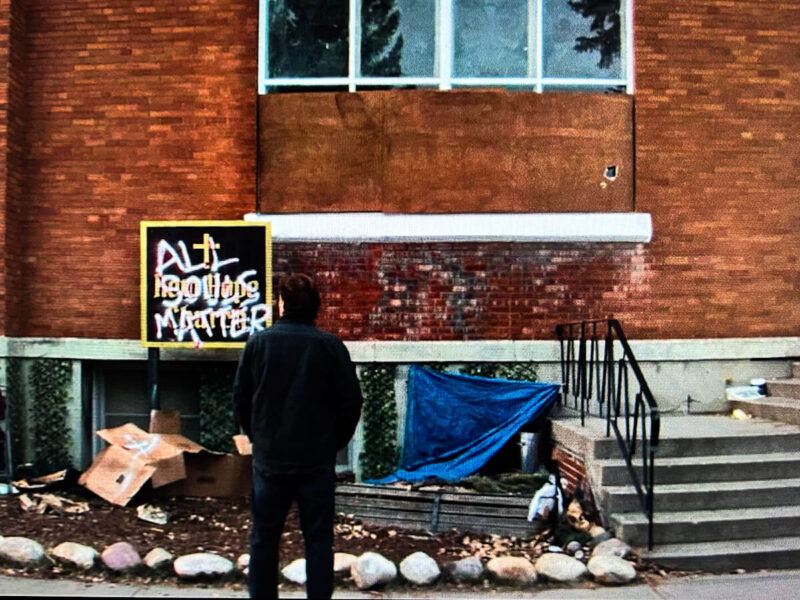
The thinking behind this seems to be that those left behind would be angry at the remaining Christians (though not true Christians because, you know, they got left behind) as they proclaimed that those who disappeared were Christians, that the fact they disappeared is proof a god favored them. The reaction: those left behind who didn’t think they were Christian (i.e., the true heretics) would be angry at this perceived sense of Christian superiority and would adopt a slogan like “All souls matter!”
I’m not even sure what they’re suggesting with this little detail. Do they think the dumb liberals left behind (because you can’t be a liberal and a true Christian) would be highly offended at the sense of Christian superiority that they would adopt an altered slogan from the right and throw it back at the remaining Christians? Do they think the dumb liberals would be so self-contradictory that they would argue about the equality of all souls even though they don’t believe in a god (because you know all liberals are atheists)?
I just don’t get this little detail. I don’t think they do either.
This afternoon, we went to our favorite park — the first time since Helene. We knew a lot of the trails would be closed: those winding through the forest would have trees blocking the way, and those along the coast of the small lake were boardwalks and would likely be destroyed.
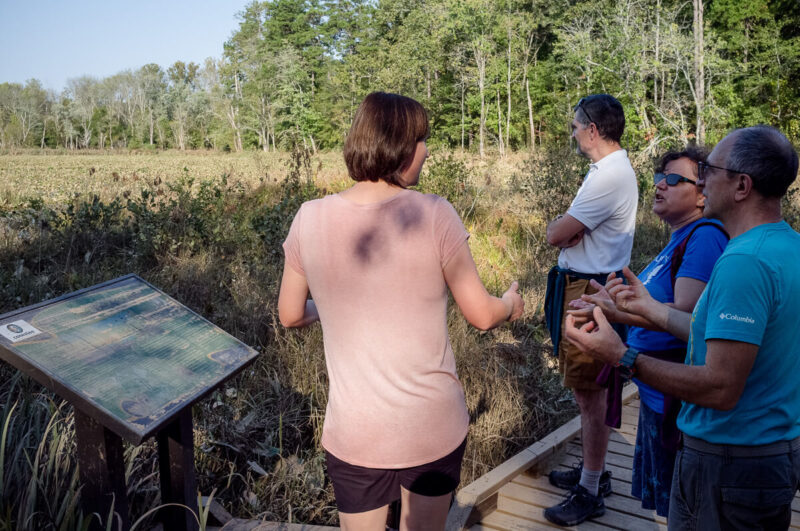


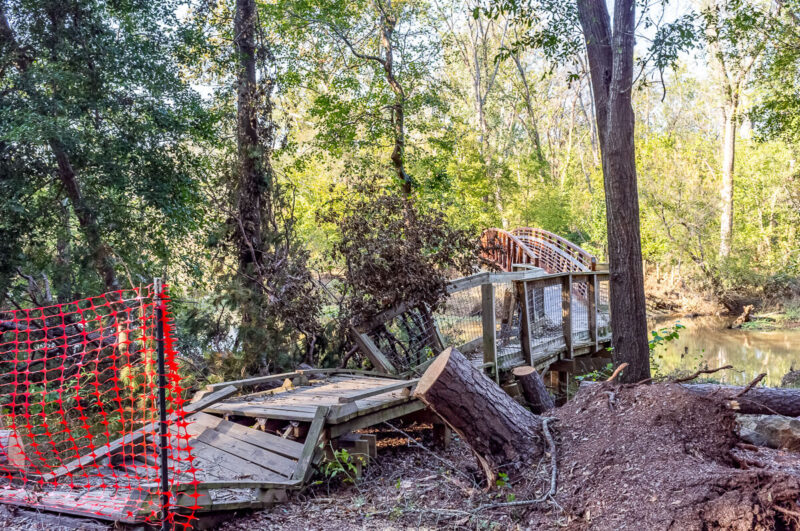
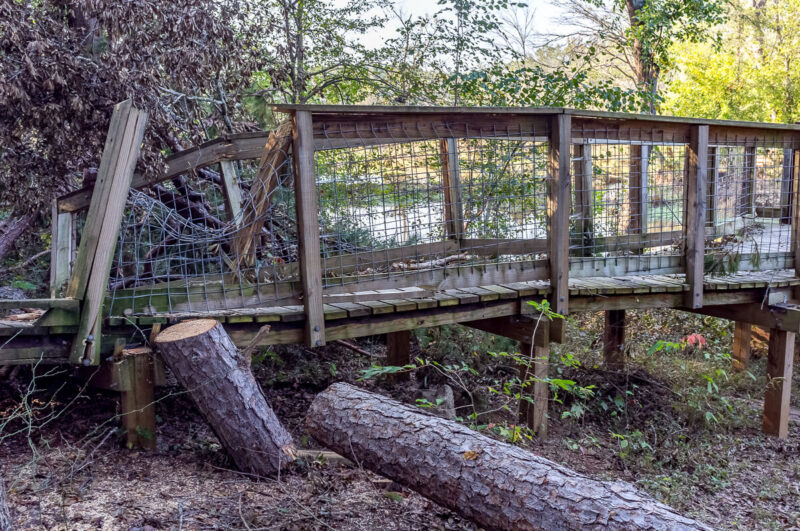

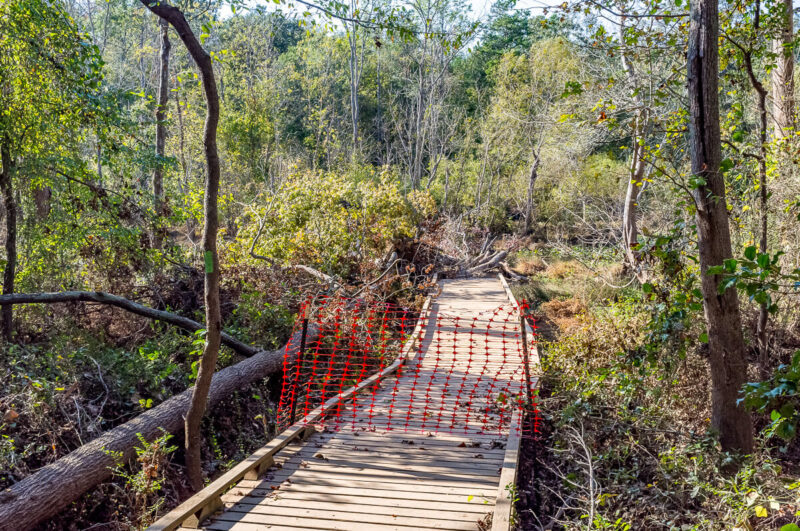
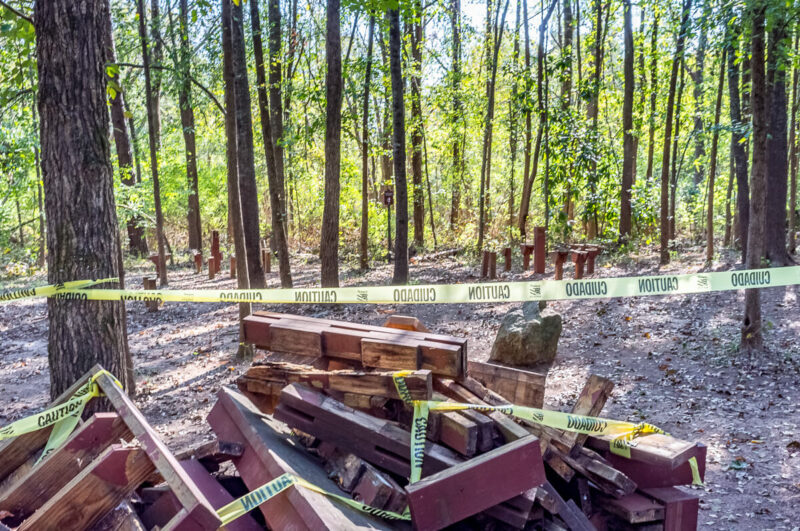
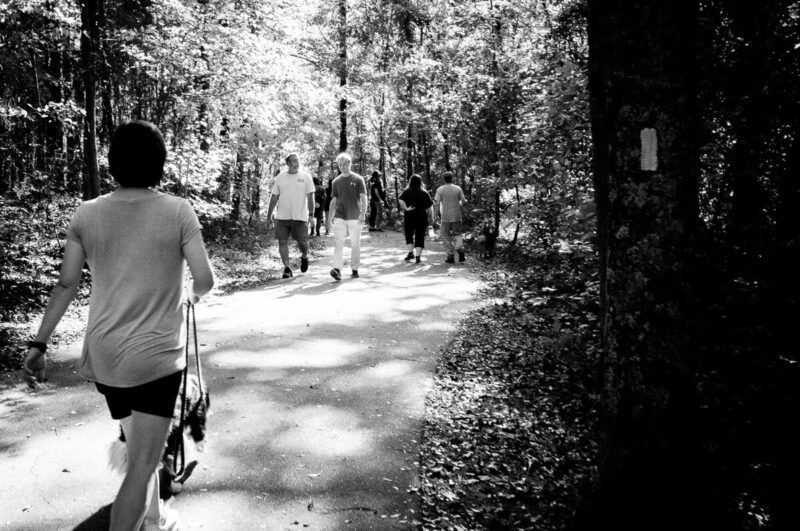
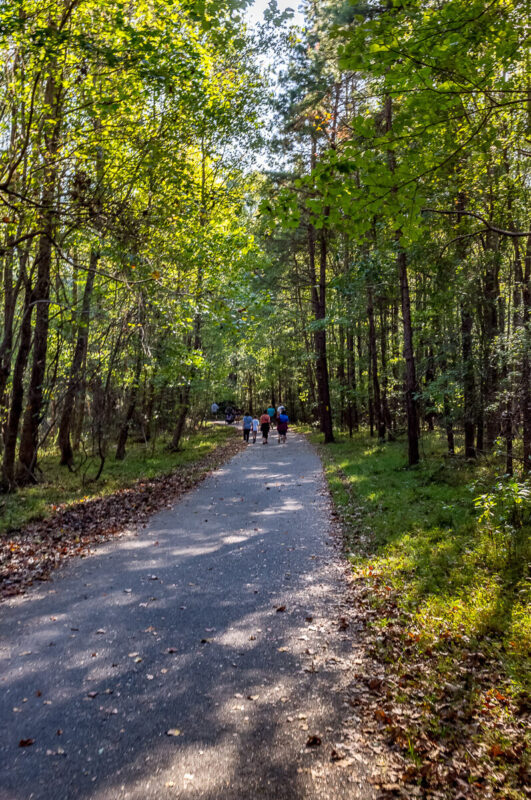
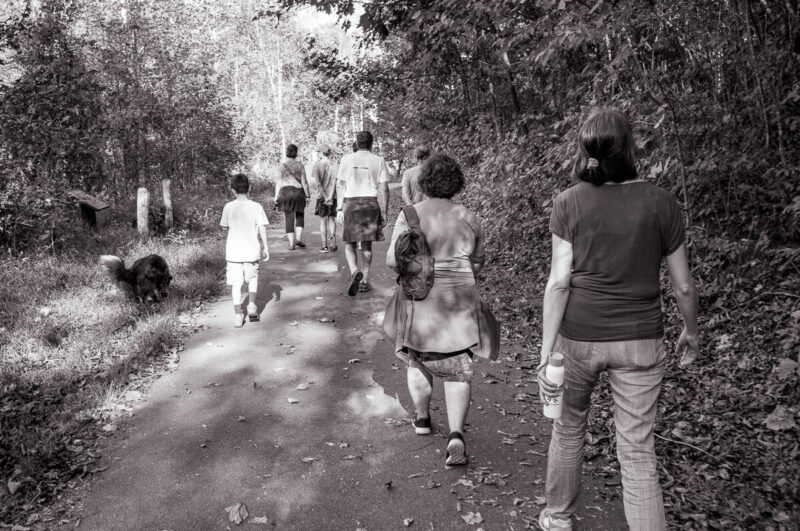

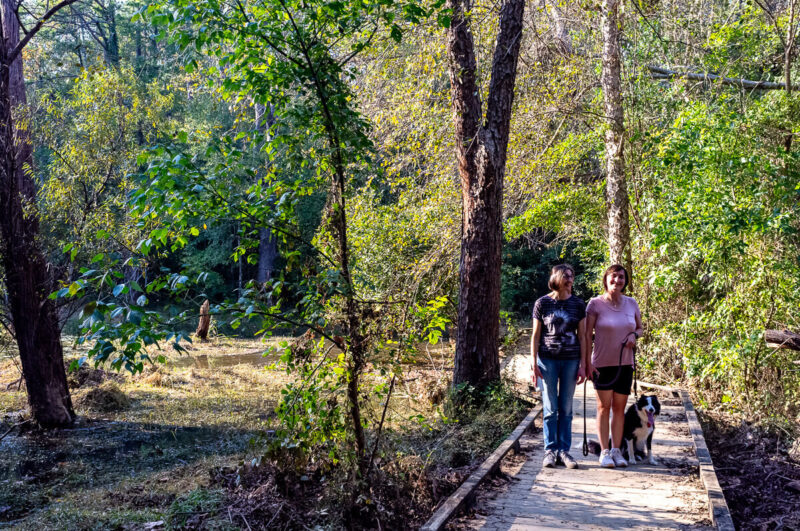
Most of the unpaved trails were closed; not all were. Most of the boardwalks were washed out; not all were.
In the evening, a party — the best parties are often the unplanned parties.
“We’re having our first ognisko tonight. You should come.”
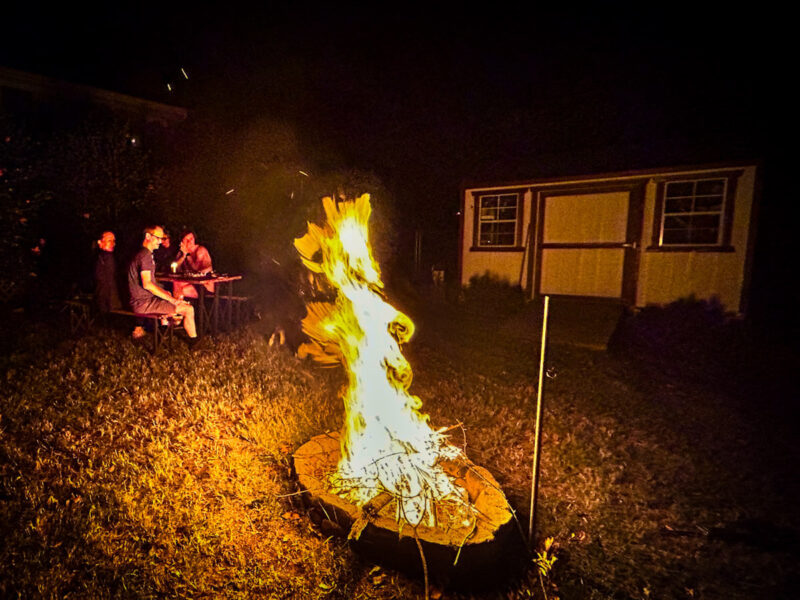
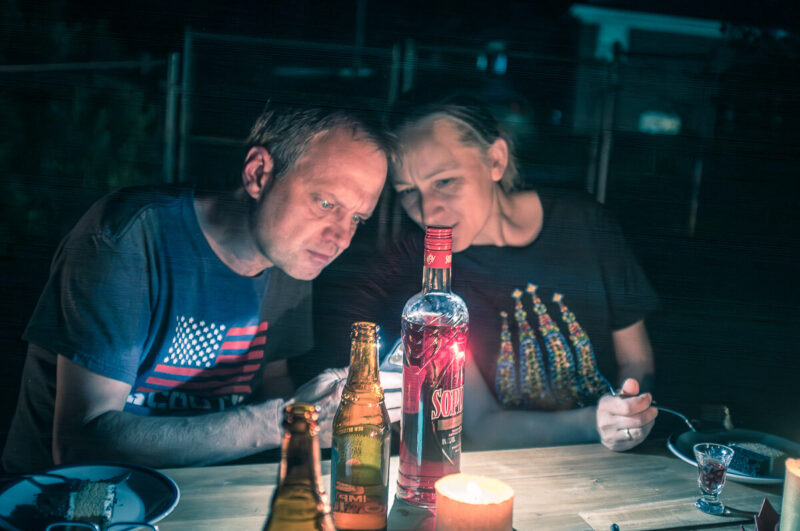
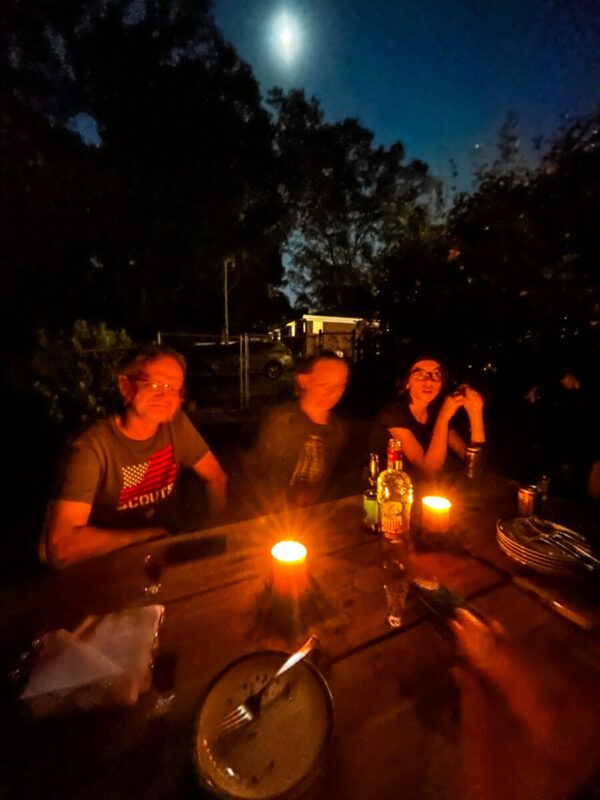
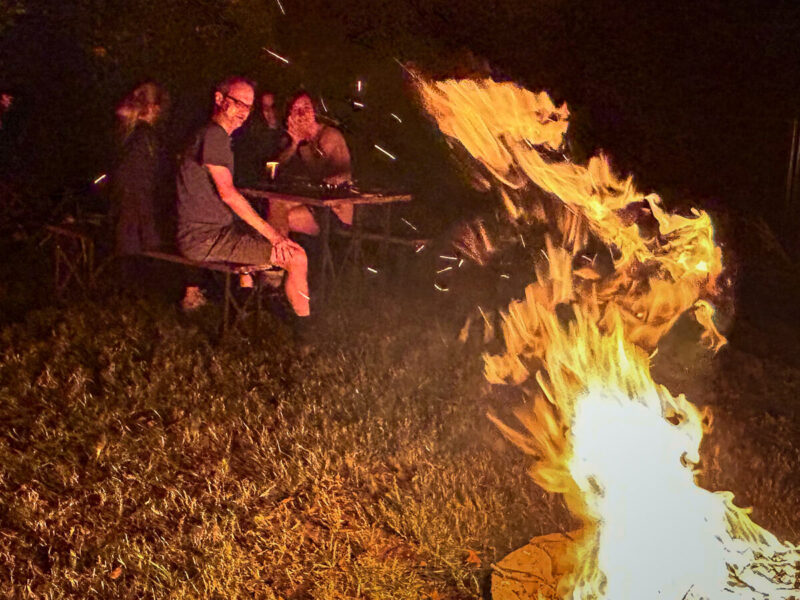


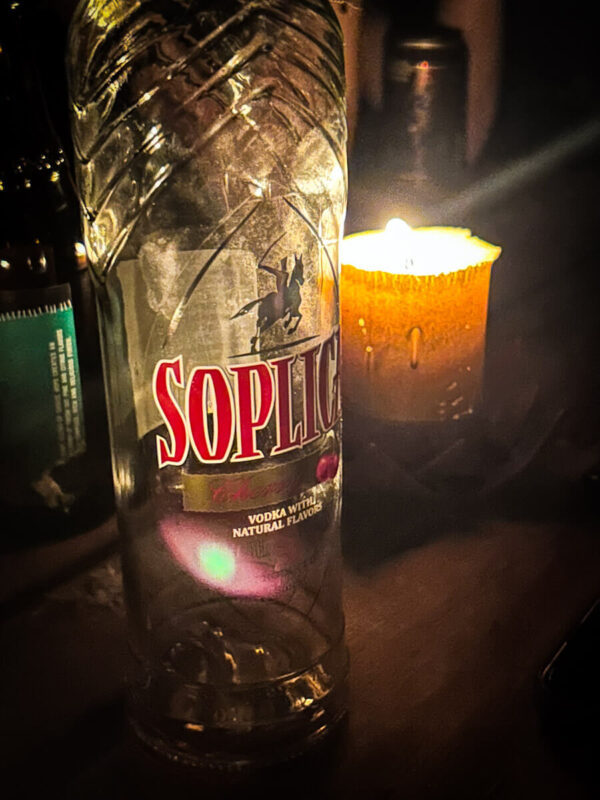
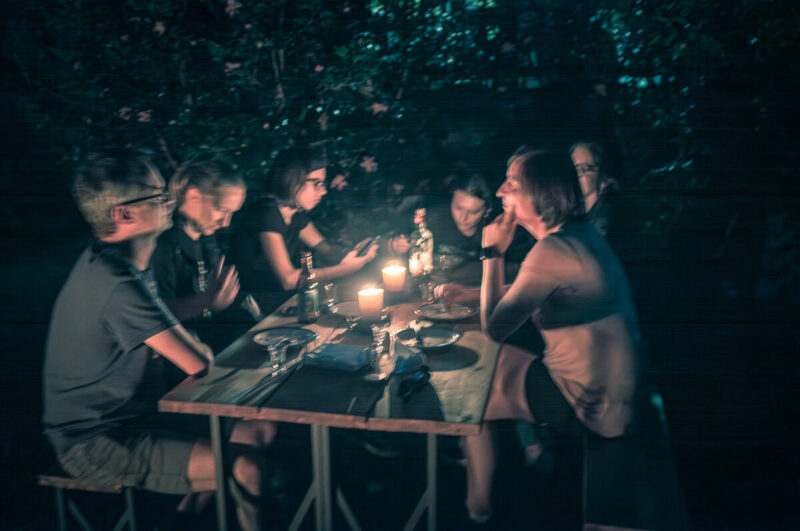
“Okay — we’ll bring dessert.”
The evening flows, a bottle of vodka appears, the evening continues, the bottle is empty. A Sunday-night party that ends just a little later than it should.
